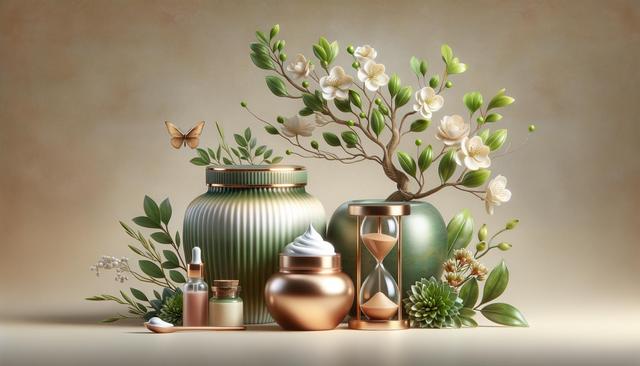Understanding Anti-Aging: A Holistic Approach for Women
The journey of aging is natural, but thoughtful choices can help women support their skin, body, and mind along the way.

What Does Anti-Aging Really Mean?
Anti-aging, often misunderstood as a quest to reverse time, is better seen as a proactive approach to aging gracefully. For women, this concept extends beyond just skincare—it encompasses physical health, mental well-being, and lifestyle choices that support long-term vitality. Rather than chasing unrealistic ideals, an anti-aging strategy encourages sustainable habits that promote resilience and confidence at every stage of life. It’s not about fighting age but embracing it with more strength and awareness.
Anti-aging involves understanding how age-related changes occur and how to mitigate their impacts. These changes can include a decline in collagen production, slower cellular regeneration, and shifts in hormone levels. By addressing these factors with a combination of good nutrition, regular physical activity, hydration, and skincare routines, women can maintain a healthier appearance and overall wellness. At its core, anti-aging is about prevention and preservation, not perfection.
Nutrition’s Role in Aging Gracefully
What we eat significantly influences how we age. A balanced diet rich in antioxidants, vitamins, and minerals can help reduce oxidative stress, which contributes to visible signs of aging like wrinkles and dull skin. Nutrients such as vitamin C, E, zinc, and omega-3 fatty acids support skin repair and elasticity, while also boosting immunity and brain function.
Here are some dietary habits that support anti-aging:
- Incorporating colorful fruits and vegetables, especially berries, spinach, and carrots
- Choosing whole grains over refined carbohydrates
- Adding fatty fish like salmon or flaxseeds for essential fats
- Staying hydrated with water and herbal teas
- Limiting processed foods and sugar intake
Aging well also involves maintaining a healthy weight, which helps reduce the risk of conditions such as diabetes and cardiovascular disease. Women in particular benefit from calcium and vitamin D to support bone density, especially during and after menopause. Consistency in eating habits, rather than extreme diets, goes a long way in promoting longevity.
Skincare Essentials for Mature Skin
As women age, their skin undergoes changes such as reduced elasticity, increased dryness, and uneven pigmentation. A well-rounded skincare routine can help address these concerns and promote a radiant complexion. While youthful skin cannot be permanently preserved, it can be supported and enhanced with appropriate care.
Key elements of an effective anti-aging skincare routine include:
- Gentle cleansing to maintain the skin’s natural barrier
- Daily use of sunscreen to protect against UV damage
- Moisturizers with hyaluronic acid or glycerin for hydration
- Topical antioxidants like vitamin C for brightening
- Retinoids or peptides to support collagen production
It’s important to note that consistency and patience are essential. Skincare products often take weeks or months to show visible results. In addition to topical treatments, practices such as facial massage, adequate sleep, and stress management contribute to better skin health. Visiting a licensed dermatologist can also provide personalized guidance based on individual skin types and concerns.
Exercise and Movement: Supporting the Body Over Time
Physical activity plays a critical role in the anti-aging process. Regular movement helps maintain muscle mass, bone strength, cardiovascular health, and mental clarity—all of which contribute to aging well. For women, especially those navigating hormonal changes, exercise can also alleviate symptoms such as mood swings and sleep disturbances.
Effective forms of exercise to support aging include:
- Weight-bearing exercises like walking, dancing, or resistance training
- Flexibility and balance activities such as yoga or Pilates
- Cardiovascular workouts like swimming or cycling
- Mind-body practices for stress reduction and relaxation
Consistency is more important than intensity. Even 30 minutes of moderate activity most days of the week can yield noticeable benefits. In addition, staying active helps reduce the risk of chronic diseases and improves mobility, allowing women to maintain independence and a higher quality of life as they age. Engaging in group classes or outdoor activities can also foster social connections, which are vital for mental and emotional well-being.
Mental and Emotional Wellness in the Aging Process
Anti-aging is not solely a physical pursuit; emotional and mental health are just as crucial. As women age, they often face transitions such as career shifts, family changes, or personal loss. These experiences can impact self-esteem and overall happiness. Cultivating mental resilience and emotional balance is vital for a positive aging experience.
Strategies to support mental well-being include:
- Practicing mindfulness or meditation to manage stress
- Engaging in hobbies and creative outlets
- Maintaining strong social relationships
- Seeking professional support when needed
- Setting new goals and embracing lifelong learning
Age can bring clarity, wisdom, and a deeper sense of self. Rather than focusing on what is lost, women benefit from recognizing what is gained through experience. Emotional wellness also supports physical health, with studies showing that positive outlooks can reduce the risk of chronic illness and improve recovery times. Prioritizing rest, connection, and purpose can help women navigate aging with grace and fulfillment.